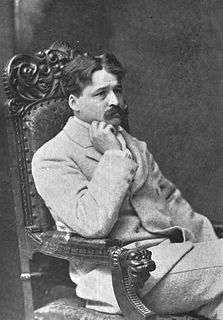A Quote by Wallace D. Wattles
The prophets and seers and great men and women, past and present, were made great by what they perceived from God, not by what they were taught by men.
Related Quotes
Preachers are not sermon makers, but men makers and saint makers, and he only is well-trained for this business who has made himself a man and a saint. It is not great talents nor great learning nor great preachers that God needs, but men great in holiness, great in faith, great in love, great in fidelity, great for God - men always preaching by holy sermons in the pulpit, by holy lives out of it. These can mold a generation for God.
I am ready to talk today. I have been in a great many councils, but I am no wiser. We are all sprung from a woman, although we are unlike in many things. We can not be made over again. You are as you were made, and as you were made you can remain. We are just as we were made by the Great Spirit, and you can not change us ; then why should children of one mother and one father quarrel ? — why should one try to cheat the other ? I do not believe that the Great Spirit Chief gave one kind of men the right to tell another kind of men what they must do.
What is a great love of books? It is something like a personal introduction to the great and good men of all past times. Books, it is true, are silent as you see them on their shelves; but, silent as they are, when I enter a library I feel as if almost the dead were present, and I know if I put questions to these books they will answer me with all the faithfulness and fulness which has been left in them by the great men who have left the books with us.
Why do people speak of great men in terms of nationality? Great Germans, great Englishmen? Goethe always protested against being called a German poet. Great men are simply men and are not to be considered from the point of view of nationality, nor should the environment in which they were brought up be taken into account.
Back in the days when men were hunters and chest beaters and women spent their whole lives worrying about pregnancy or dying in childbirth, they often had to be taken against their will. Men complained that women were cold, unresponsive, frigid... They wanted their women wanton. They wanted their women wild. Now women were finally learning to be wanton and wild - and what happened? The men wilted.
For women, marriages foreclosed often resulted in an accumulation of booty; for men, these failed projects of implausible optimism were more likely to manifest themselves in material lack. It was hard to resist the metaphorical impression that women got to keep the past itself, whereas men were simply robbed of it.
If men were angels, no government would be necessary. If angels were to govern men, neither external nor internal controls on government would be necessary. In framing a government which is to be administered by men over men, the great difficulty lies in this: you must first enable the government to control the governed; and in the next place oblige it to control itself. A dependence on the people is, no doubt, the primary control on the government; but experience has taught mankind the necessity of auxiliary precautions.
Men didn't like to empty bedpans, so we made women nurses. Then men didn't like to do the administrative stuff, so women were allowed to become secretaries. That's the way they entered the work force. Then we began to educate them because they had to be educated. But it wasn't until after World War II that most of the great universities of this country became coeducational.



































